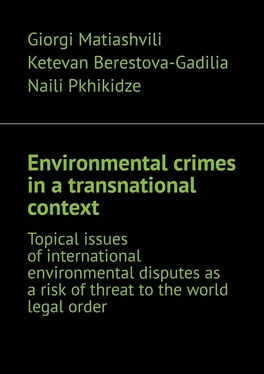The principle of fulfillment in good faith of obligations these days represents the main core of the existence of the structure of international law as a source of legal force of this law and interstate relations, since without fulfilling obligations incompliance with the international law, a civilized relationship between subjects of international law to achieve the goals provided for by the UN Charter is impossible. The importance of this principle is indicated in the preamble of the UN Charter, which indicates “The respect for obligations arising from treaties and other sources of international law,” and in part 2 of article 2 of the UN Charter, which states that “All Members of the United Nations Organization shall fulfill in good faith the obligations undertaken by them in accordance with the present charter, in order to ensure to all of them collect of rights and advantages arising from belonging to the membership of the Organization. Hereinafter, the principle of fulfillment in good faith of obligations according to international law received reinforcement in individual international norms, in particular: in the statutes of International Court of Justice of United Nations organization (Article 38); Declarations on the principles of international law. These are generalized norms that reflect the characteristic features and the main content of international law, having supreme legal force.
The underlying principles of international law are fixed in the UN Charter; Declaration on the principles of international law concerning friendly relations and cooperation between states in accordance with the 1970 UN Charter; In the final act CSCE 1975y.
Organization for Security and Co-operation in Europe (OSCE), the world’s largest regional security organization is engaged in security issues. It unites 57 countries located in North America, Europe and Central Asia.
The former name is Conference for Security and Cooperation (CSCE) in Europe. It was convened as a standing international forum of representatives of all European states (except Albania and Andorra), as well as the United States and Canada, to develop measures to reduce military confrontation and strengthen security in Europe. The meeting was held in three stages.
July 3 – 7, 1973 – Helsinki – Conference of Ministers of Foreign Affairs;
September 18, 1973, July 21, 1975 – Geneva – Introduction of proposals, amendments and agreement on the text of the Final Act;
July 30 – August 1, 1975 in Helsinki-the capital of Finland, the leaders of 35 original member nations signed the final act of the conference on Security and Cooperation in Europe (Helsinki Accords).
– Vienna Convention on the Law of Treaties 1969 (preamble, articles 26, 31, 46).
Vienna Convention on the Law of Treaties emphasizes the important role of international treaties, as “a source of international law and as a means of developing peaceful cooperation between nations, regardless of their differences in their state and social system”, in all fields of cooperation.
Not only abovementioned, but also other principles of international law form the foundation of the law of environmental safety and international security. This provision was specially emphasized by the UN General Assembly. Effective collective measures can only be carried out on the basis of respect for the principles of sovereign equality, non-interference in internal affairs and self-determination.
Respect for human rights and democracy are of paramount significance to prevent a threat to the world. Everyone has the right to life, and the state and the international community as a whole must ensure an international setup, where in this right can be fully realized (Article 3 and 28 of Universal Declaration of Human Rights). From this, the human right to peace is emerging, which is associated with the right to peace of the people and the state. In the Declaration on “the Right of Peoples to Peace”, the ensuring of which is the fundamental obligation of states. And this also obliges them to apply the principles of the peaceful settlement of disputes, both intrastate and international, disputes of a different nature, including environmental disputes.
We hope, that this thesis will help to improve understanding of the relationship between the protection of human rights in accordance with the “European Convention on Human Rights” and the ambient environment.
Ecology, offense, human rights, resources, court, international, environment, environmental crimes, international law, human, hostile use, planet, environmental security, ecological environment (ecosystem), declaration, ecocide, international treaties, eco-terrorism, United Nations (UN), obligations, legal order, peace, law, justice, cooperation, state, damage, international legal responsibility.
Human Being is part of nature. Outside of nature, without using its resources, he/she cannot exist. Nature will always be the basis and source of human life. In relation to a person, it performs a number of functions related to the satisfaction of his/her needs: ecological, economic, aesthetic, recreational, scientific, cultural and so on.
Ensuring a favorable quality of ambient environment and the organization of rational management of natural resources represents one of the most urgent problems of the entire world community. The awareness of the onset of the global environmental crisis by the authorities of most states of the world in the middle of the 20th century led to the formation of international cooperation in the field of ambient environment protection and a dynamic change in intrastate environmental legislation in most countries of the world. Despite the absence of a general framework agreement, the ambient environment is protected by international law. Various international treaties regulate specific environmental issues, such as for example climate change or biodiversity.
These treaties and ordinary international law assign various legal obligations to protect the ambient environment. This function is assigned to states, such as the obligation to inform, cooperate or limit wash-outs.
The proclamation of the human right onto a favorable ambient environment in the declaration of principles, adopted at the UN Stockholm Conference on the ambient environment in 1972, led to implementation (The English word-implementation is officially translated by the UN as “Effectuation”). The term was first used by the Human Rights Committee in 1981.
The original meaning of the word “implement” is to actualize something in life. it is the practical implementation within the state of international legal norms in order to fulfill the obligations assumed. With regard to the law, implementation is the actualization at the intrastate level of obligations envisaged in international agreements\international environmental norms and standards in the legislation of the countries of the world.
This was the impetus for the formation of environmental legal awareness among the population, the growth of the public environmental movement and the formation of judicial practice in cases of protecting the rights and legitimate interests of citizens in the field of environmental protection. All measures aimed at overcoming the crisis in the environmental field require the need for cooperation between states in the form of C-Global – a global dialogue format, and only through the joint efforts of all states, it is possible to fight against the environmental crisis. The most important issue of the new paradigm of sustainable development should be the reassessment of the environmental factor. Preservation and reproduction of the ambient environment should become an obligatory condition for the sustainable development of civilization. The representatives of the sciences society of international law not infrequently drew attention to the need to strengthen the international legal basis for environmental cooperation and create truly effective international control mechanisms in this field.
Читать дальше












